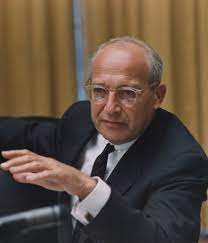Rostow, Walt W.

Bio: (1916-2003) American economist and political scientist. Walt Rostow earned his doctorate in economics from Yale University and later taught at Columbia University and the Massachusetts Institute of Technology. In his research, throughout his life, he focused on the question of the causes of the economic development of different countries. To answer this question, he developed a theory of modernization based on the concept of the "stages of economic growth", and it is presented in the book Stages of Economic Growth: A Non Communist Manifesto (1960). In the „traditional stage“, or the first stage of growth, where poor countries are, economic institutions, technology, and cultural values do not provide fertile ground for economic development. In underdeveloped countries, traditional culture, social institutions, weak work ethic, and lack of entrepreneurial spirit impede economic efficiency. In addition, large families, with many dependent members, make it difficult to save for investments. Fatalistic values, which emphasize that suffering is a normal part of life and promote acceptance of one's own bad destiny, are another major obstacle to economic development. The government in underdeveloped countries makes it even more difficult to abandon traditional values by controlling wages and prices.
In the second stage, which Rostow calls „the preconditions for take-off“ the process of development begins when the elite start initiating innovations in economic activities. Well-educated elite steers the country toward investments in new technology and infrastructure, such as transportation and water supplies. All of this helps build up conditions that would enable countries to take-off. In the third or "take-off stage", poor countries begin to reject traditional values and institutions, and people begin to save and invest for future gains. Growth is generated from a small number of economic sectors, such as textiles or manufacturing. These few take-off industries become drivers of growth, while other sectors lag behind and remain dominated by traditional practices. Developed countries should help this process of economic growth of poor countries by financing strategic areas: birth control programs, infrastructure projects (electrification, transport), and the development of new industrial sectors.
In the fourth stage, which the author calls "the drive for maturity", there is a stable development of new technologies and successful adoption of social institutions of rich countries. In the fifth stage, which is called "the age of high mass consumption", ordinary people, as they have increased their standard of living, begin to spend money on a wide range of goods and services, and the state itself joins rich countries.
In the following books, Rostow also investigates the reasons for the success and failure of different countries. He had a great influence not only on the economy, political science, and sociology but also on specific US policies, as he worked as an economic adviser to US Presidents Dwight D. Eisenhower and John F. Kennedy.
Fields of research
Culture Economy Entrepreneurship Industry Innovation Institution and Organization Market Modernity Morality Poverty State Technology TraditionTheoretical approaches
Modernization TheoryMain works
The Process of Economic Growth (1952);
The Stages of Economic Growth: A Non Communist Manifesto (1960);
Politics and the Stages of Growth (1971);
Why the Poor Get Richer and the Rich Slow Down: Essays in the Marshallian Long Period (1980);
Theorists of Economic Growth from David Hume to the Present (1990).

